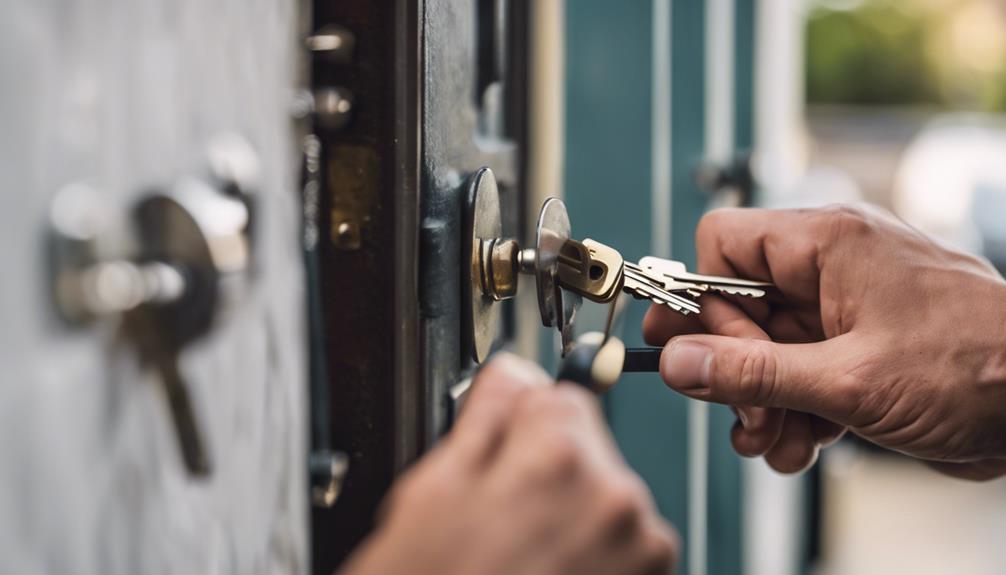Re-keying plays an essential role in multi-unit buildings by enhancing security and ensuring that only authorized residents and staff have access. When tenants move in or out, re-keying prevents old keys from being used, which boosts peace of mind. It also addresses concerns about lost or stolen keys, maintaining a secure environment for everyone. Additionally, effective re-keying can restrict access to shared areas, reducing the risk of unauthorized entry. By prioritizing these measures, you foster a sense of trust among residents. You'll discover even more insights about securing your community and enhancing tenant safety.
Key Takeaways
- Rekeying enhances security by ensuring that only authorized individuals have access to units, especially during tenant turnover.
- Prompt rekeying after lost or stolen keys prevents unauthorized entry and maintains resident trust in building security.
- Regular rekeying, along with strong locks and surveillance, reinforces safety and reduces the risk of unauthorized access in multi-unit buildings.
- Effective key management and rekeying of common areas protect residents and foster a sense of community safety.
- Clear access protocols for maintenance staff streamline emergency responses while safeguarding residents' privacy and security.
Importance of Security Enhancements
Enhancing security in multi-unit buildings is essential for protecting residents and their property. When you prioritize security, you create a safe environment that fosters trust and peace of mind among tenants.
One effective way to improve security in multi-unit properties is through multi-unit rekeying. This process guarantees that only authorized individuals have access to the building, reducing the risk of unauthorized entry. Additionally, re-keying can help in lockout situations, providing a quick solution to regain access when needed.
Apartment building rekeying is particularly important when there's tenant turnover or after a security breach. By changing the locks and issuing new keys, you not only safeguard current residents but also show that you care about their safety. This proactive approach reinforces your commitment to a secure living environment.
Additionally, investing in enhanced security measures, such as improved lighting and surveillance systems, complements the benefits of rekeying. Together, these strategies create a thorough security plan that protects both residents and their belongings.
Tenant Turnover and Key Management
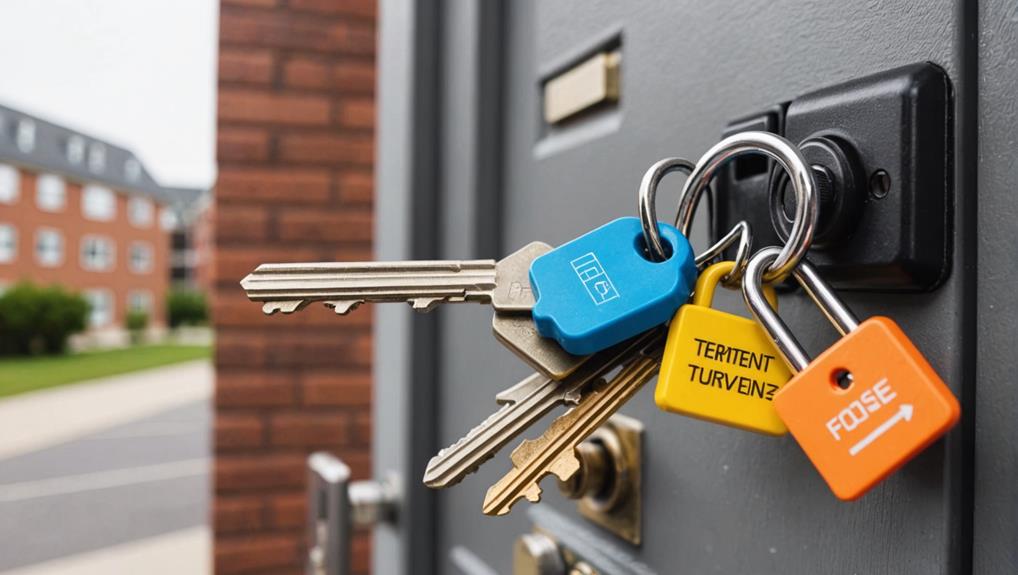
Managing keys effectively during tenant turnover is fundamental for maintaining security in multi-unit buildings. When a tenant moves out, it's imperative to guarantee that previous keys can no longer access the unit. This is where rekeying for condos becomes essential. By rekeying the locks, you're not just enhancing security; you're also giving new tenants peace of mind knowing they're the only ones with access.
Additionally, it's important to stay informed about best practices for re-keying to guarantee compliance with legal considerations and optimize security measures.
Shared access rekeying is another significant aspect to bear in mind, especially in buildings with common areas or amenities. When a tenant leaves, you want to make sure that any shared access points are secure as well. This could involve rekeying locks on common entrances or fitness rooms to prevent unauthorized access.
Taking these steps during tenant turnover demonstrates your commitment to providing a safe environment for all residents. It's not just about changing locks; it's about fostering trust and guaranteeing everyone feels secure in their home.
Lost or Stolen Keys
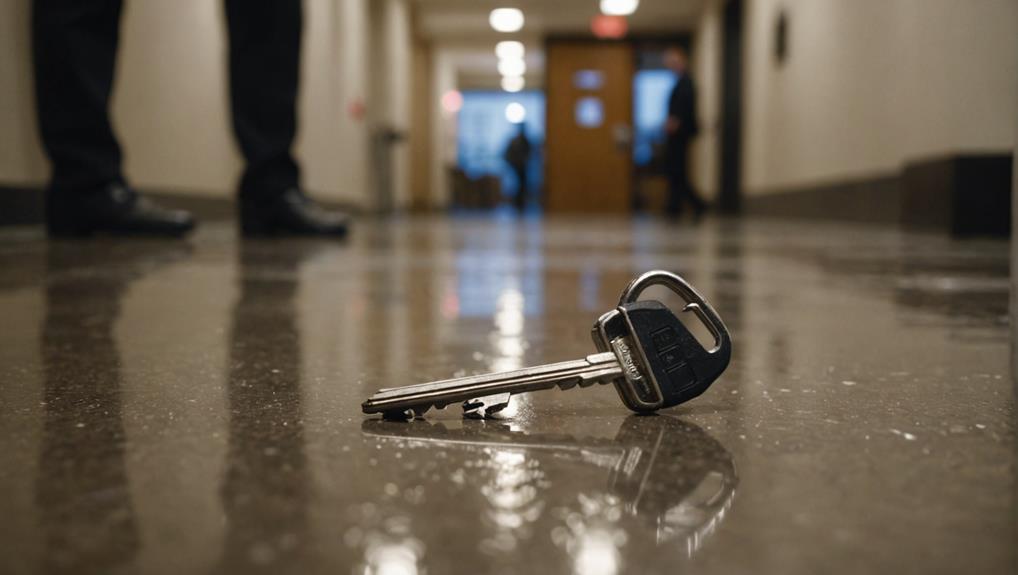
When keys go missing or get stolen, it can create significant security concerns for both tenants and property managers in multi-unit buildings. You might feel anxious about who's access to your home, while property managers face the challenge of guaranteeing everyone's safety.
Addressing this issue quickly is vital to maintain trust within the community, especially considering the legal obligations surrounding tenant re-keying responsibilities.
If you lose your keys or suspect they've been stolen, it's important to inform your property manager right away. They can take immediate action, such as re-keying affected units, which helps prevent unauthorized access and provides peace of mind to all residents.
You should also consider changing your own locks if you're worried about your personal security.
Additionally, it's wise to keep a spare key in a secure location or with a trusted neighbor. This way, you reduce the risk of being locked out while still maintaining control over who can access your space.
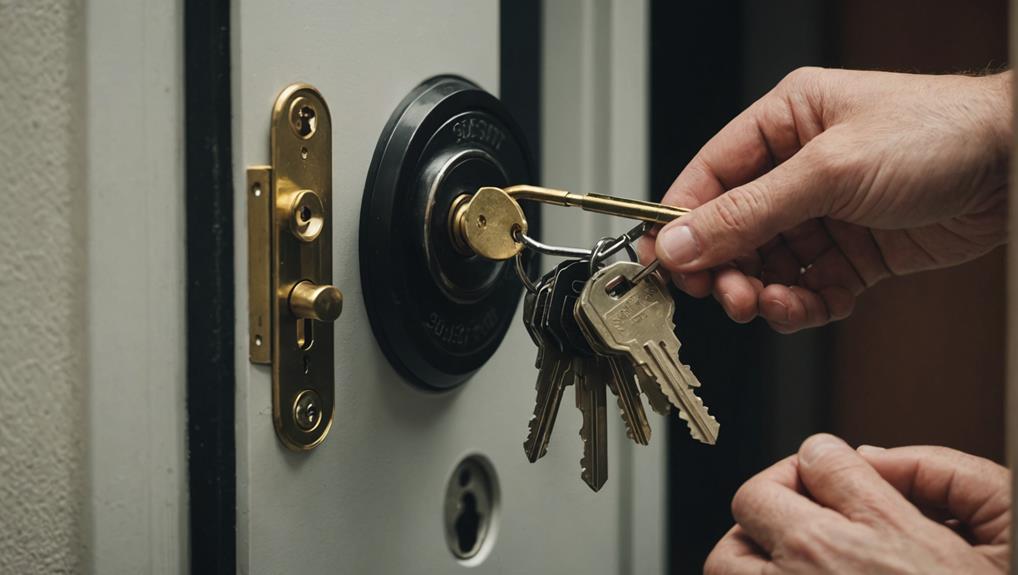
To safeguard your home from unauthorized access, it's essential to implement effective security measures in multi-unit buildings. One of the first steps you can take is to guarantee that all entry points are secure. This includes reinforcing door locks, installing deadbolts, and using high-quality security systems that provide alerts for any suspicious activity.
Additionally, understanding the benefits of lock re-keying can complement these measures, as it allows you to change the internal configuration of your locks without replacing them entirely, assuring that lost or stolen keys no longer grant access to your unit. Understanding Lock Re-Keying is a valuable practice for enhancing security.
You should also consider the advantages of re-keying your locks regularly. This practice not only protects your unit but also contributes to the overall safety of your neighbors. Whenever someone moves out or you suspect that keys may be in the wrong hands, re-keying can prevent unwanted access.
Encouraging a strong sense of community is another important aspect. By getting to know your neighbors, you can create a network of vigilance where everyone watches out for one another. This helps deter potential intruders who may feel less welcome in a tightly-knit environment.
Lastly, educate everyone in your building about the importance of reporting suspicious behavior. Being proactive and attentive can make a significant difference in maintaining safety and preventing unauthorized access. Together, you can foster a secure living space for everyone.
Maintenance Staff Access Control
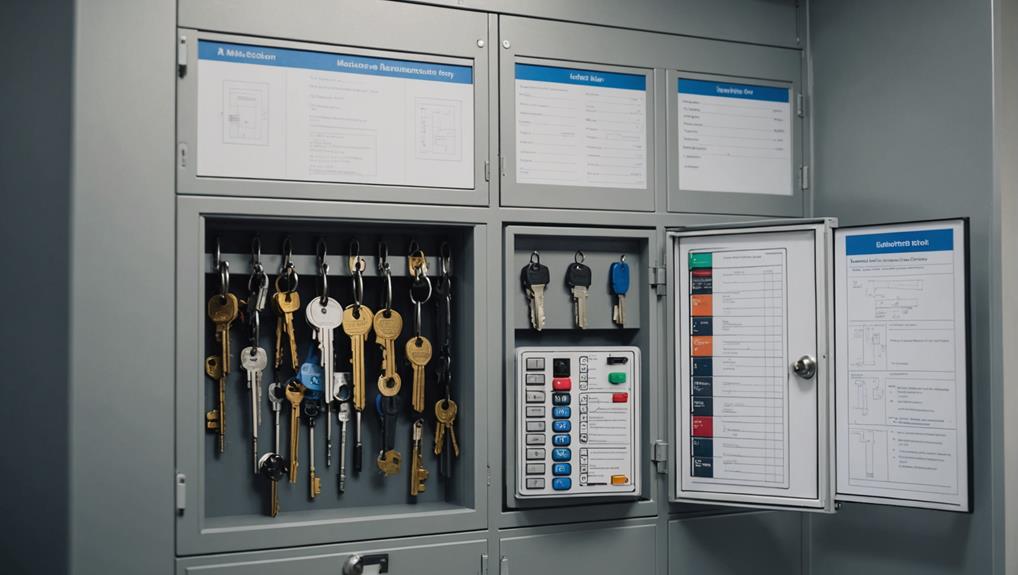
When it comes to maintenance staff access control, you need effective strategies to manage who enters your building.
Proper access management not only enhances security but also guarantees rapid response during emergencies.
Implementing a system that allows for master keying vs. re-keying can greatly streamline access for maintenance staff while maintaining a secure environment.
Let's explore how these elements work together to create a safer environment for everyone.
Access Management Strategies
Effective access management strategies are vital for controlling maintenance staff access in multi-unit buildings. By implementing a robust access system, you guarantee that maintenance personnel can perform their duties efficiently while safeguarding residents' privacy and security.
Start by establishing clear protocols for who can access which areas and when. Consider using electronic access control systems that allow you to grant temporary access codes for specific tasks. This not only simplifies the process but also helps you track who enters and exits the building.
Regular training for maintenance staff is important. Make sure they understand the significance of confidentiality and respect for residents' spaces. Encourage open communication so that staff members can report any unusual activities or concerns.
Lastly, conduct routine audits of your access management strategy. This includes evaluating the effectiveness of your current systems and making necessary adjustments. By routinely reviewing your approach, you can adapt to the evolving needs of your building and its residents.
Ultimately, well-implemented access management strategies not only streamline maintenance operations but also foster a sense of trust and security within the community you serve.
Security Enhancement Benefits
Implementing maintenance staff access control not only boosts security but also enhances the overall safety of your multi-unit building. By managing who can access specific areas, you guarantee that only authorized personnel enter sensitive spaces. This controlled access reduces the risk of theft, vandalism, or other security breaches that could affect residents' peace of mind.
When you provide maintenance staff with tailored access, you're also fostering a sense of trust among residents. They'll feel more secure knowing that their living environment is protected by a system that prioritizes their safety.
Plus, having a streamlined access process allows maintenance teams to respond promptly to issues, guaranteeing that repairs and services are conducted efficiently without compromising security.
Moreover, regular audits of access permissions can help you stay proactive in identifying any potential security gaps. By continuously monitoring who's access, you reinforce a culture of safety and accountability within your building.
Ultimately, maintaining a secure environment benefits everyone—residents, staff, and management alike. By focusing on access control, you're not just protecting property; you're also nurturing a community where everyone feels safe and valued.
Emergency Response Coordination
Maintaining a secure environment not only safeguards residents but also sets the stage for effective emergency response coordination.
When emergencies arise, quick access for maintenance staff and responders is essential. By implementing a re-keying system, you guarantee that essential personnel can enter the building swiftly, minimizing delays during critical situations.
You'll want to establish clear protocols that grant maintenance staff immediate access to all units. This way, they can address emergencies such as leaks, electrical failures, or other urgent issues without unnecessary wait times.
An organized access control system prepares your team to respond effectively and securely.
Regular communication with local emergency services about your access policies can enhance this coordination even further. They'll appreciate knowing how to navigate your building in a crisis.
Emergency Situations and Lockouts
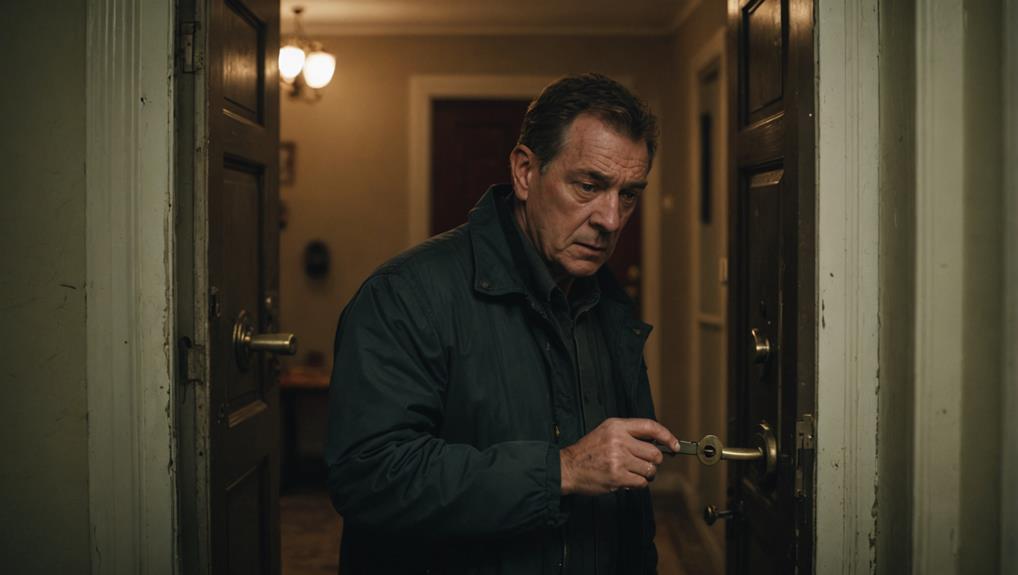
In emergency situations, quick access solutions are essential to guarantee safety and security.
You need to balance the need for rapid entry with preventing unauthorized access, which can be a challenge.
Knowing when to call emergency locksmith services can help you navigate lockouts effectively while maintaining control of your building.
For instance, utilizing services like 24/7 mobile lock repair guarantees that you have immediate assistance when needed, providing peace of mind during stressful times.
Quick Access Solutions
When you find yourself locked out of your apartment or facing an emergency situation, quick access solutions become essential for your peace of mind.
You need a reliable way to regain access without delay, especially when time is of the essence.
Consider establishing a relationship with a trusted locksmith who can provide emergency services. Make sure to save their contact information on your phone and inform your neighbors about the arrangement.
It's also worth discussing access protocols with your building management. They may have a procedure for emergency access that can make life easier for you and your neighbors in crisis situations.
Additionally, think about investing in a secure keyless entry system or smart locks.
These solutions allow you to use a code or your smartphone for entry, eliminating the risk of losing your keys altogether.
Unauthorized entry can pose serious risks in multi-unit buildings, especially during emergencies or lockouts. It's essential to implement measures that prevent unauthorized access to guarantee the safety of all residents.
Start by securing all entry points with high-quality locks that resist tampering. Regularly check and maintain these locks to keep them functioning properly.
Educate residents about the importance of not sharing keys or access codes. When someone moves out, promptly re-key the locks to prevent former tenants from gaining entry. This simple step can greatly enhance security for current occupants.
Consider creating an emergency access plan that includes a protocol for residents to follow in case of lockouts. This way, they'll know exactly who to contact for assistance while maintaining security for everyone.
Regularly remind residents about the significance of vigilance. Encourage them to report any suspicious activity immediately.
Emergency Locksmith Services
Facing a lockout can be incredibly frustrating, especially in a multi-unit building where quick access is essential. You might find yourself in an urgent situation, whether you're rushing to work, picking up kids, or just needing to get home after a long day.
That's where emergency locksmith services come in handy.
When you're in a bind, a reliable locksmith can help you regain access quickly and efficiently. Here are a few scenarios where their services are invaluable:
- Lost keys: You've misplaced your keys, and you need to get inside immediately.
- Stolen keys: Someone's taken your keys, and you want to secure your home.
- Broken locks: Your lock is malfunctioning, and you can't get in.
- Emergency entry: You've locked yourself out in an urgent situation, like a medical emergency.
Choosing a locksmith who understands the unique challenges of multi-unit buildings guarantees a speedy resolution.
They'll not only help you regain access but also advise you on preventive measures moving forward. In these moments, having a trustworthy emergency locksmith can make all the difference.
Lease Violations and Security Risks
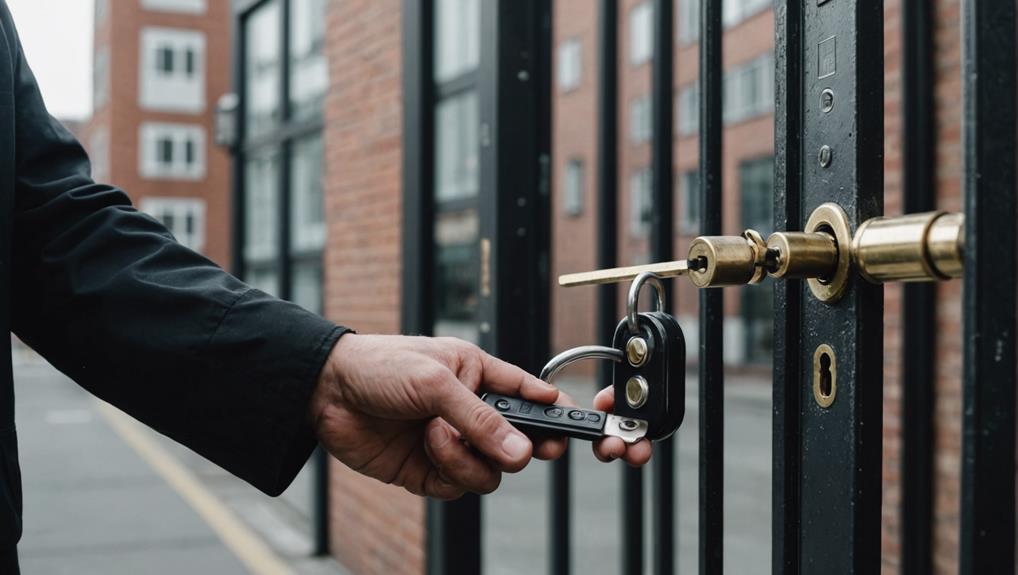
In multi-unit buildings, lease violations often lead to significant security risks that can jeopardize everyone's safety. When tenants disregard the rules, like unauthorized guests or unapproved alterations, it can create vulnerabilities in your community.
Understanding legal aspects is vital, as any changes made without proper notice can complicate the situation further. You mightn't realize it, but each violation can open the door to potential threats, making it imperative for you to address these issues promptly.
For instance, if a tenant sublets without permission, unfamiliar individuals could gain access to the building, compromising the safety of all residents. Additionally, when common areas aren't respected, they can become less secure, making it easier for unwanted visitors to slip in unnoticed.
You have a role to play in fostering a safe environment. By keeping communication open with your neighbors and property management, you can help guarantee that everyone understands the importance of adhering to lease agreements.
Encourage a culture of vigilance and accountability, where everyone feels responsible for maintaining the safety of the community. Remember, a proactive approach to lease violations not only protects your space but also cultivates a secure and harmonious living environment for all.
Upgrading to Modern Lock Systems
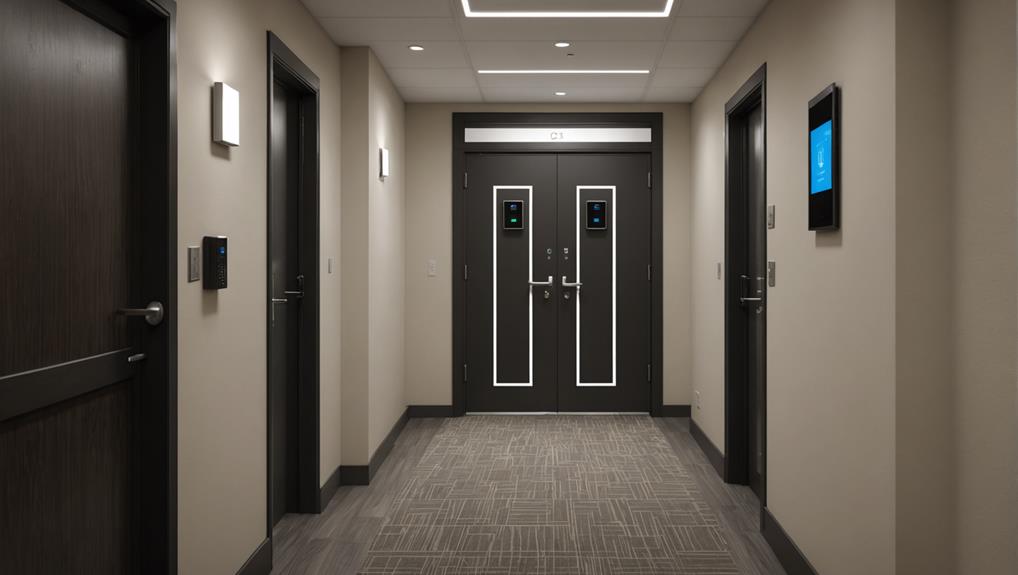
Here are some benefits of making the switch:
- Keyless Entry: Say goodbye to lost keys! Keyless systems allow for easy access through codes or mobile apps. Additionally, these systems can often be easily reprogrammed for new users, enhancing their flexibility.
- Remote Management: Control access from anywhere, making it easier to grant entry to maintenance staff or visitors.
- Audit Trails: Modern systems often provide logs of who entered and when, which can help you track access.
- Enhanced Durability: Upgraded locks are designed to withstand tampering, providing an additional layer of protection.
Investing in modern lock systems isn't just about security; it's about creating a safe environment for everyone involved.
By prioritizing the safety of your tenants, you're demonstrating your commitment to their well-being.
Building Trust With Tenants

Building trust with your tenants is vital for a harmonious living environment. When you prioritize their needs and concerns, you foster a sense of community and stability.
One way to enhance security and build trust is by ensuring that the locks in your building are reliable and up-to-date; this not only protects their homes but also shows that you care about their safety. Consider implementing regular lock replacement strategies, as essential lock replacement for business security is a significant aspect of maintaining a secure property.
Start by being transparent about policies, maintenance schedules, and any changes that might affect them. Regular communication shows you care, making tenants feel valued and heard.
Listening to their feedback is another vital step. Encourage open dialogue and make it easy for them to voice their concerns. When you address issues promptly, you demonstrate that their comfort matters to you.
Remember, a timely response can turn a negative experience into a positive one.
Moreover, consider organizing community events. These gatherings create opportunities for tenants to connect with one another and with you, strengthening those bonds of trust.
Frequently Asked Questions
How Often Should Re-Keying Be Performed in a Multi-Unit Building?
You should consider re-keying regularly, ideally every 6 to 12 months. This keeps security tight and helps guarantee that former tenants or unauthorized individuals can't access the building.
If there's a change in occupancy or a key is lost, re-keying becomes even more vital. Staying proactive about re-keying not only protects residents but also fosters a sense of safety and trust within the community you serve.
Prioritize this maintenance for everyone's peace of mind.
What Are the Costs Associated With Re-Keying Services?
Re-keying really reflects responsible resource management.
When you consider the costs, they can vary considerably based on your location and the complexity of the system. Expect to spend anywhere from $50 to $200 per lock, plus potential service fees.
If you're looking to guarantee safety and security for everyone, it's worth investing in quality services.
Can Tenants Request Re-Keying of Their Individual Units?
Yes, you can request re-keying of your individual unit, but it often depends on your lease agreement and the property management's policies.
It's a good idea to communicate your concerns about security to your landlord or property manager. They might require you to cover the costs or provide the service through their preferred locksmith.
Always remember, keeping your home safe is important, and you have the right to ask for changes that enhance your security.
How Long Does the Re-Keying Process Typically Take?
Think of re-keying like a quick tune-up for your home's security system.
Typically, the re-keying process takes about 30 minutes to an hour. You'll want to guarantee the locksmith is thorough, checking every lock for a smooth operation.
It's vital to communicate clearly about your needs so they can serve you best.
Are There Any Legal Requirements for Re-Keying in Rental Properties?
When it comes to re-keying in rental properties, you'll find that legal requirements can vary by location.
Typically, landlords must guarantee the safety and security of tenants, which often includes changing locks between occupants.
It's wise to check local laws and regulations, as some areas may mandate re-keying after tenant turnover.
Conclusion
In the ever-evolving landscape of multi-unit buildings, re-keying isn't just an option; it's a necessity. By prioritizing security enhancements, you're not only safeguarding your tenants but also building trust within your community. After all, peace of mind isn't just a luxury—it's a right. So, why leave security to chance? Embrace re-keying as a proactive choice, ensuring everyone feels safe and sound in their homes. Remember, a secure building is a happy building!

